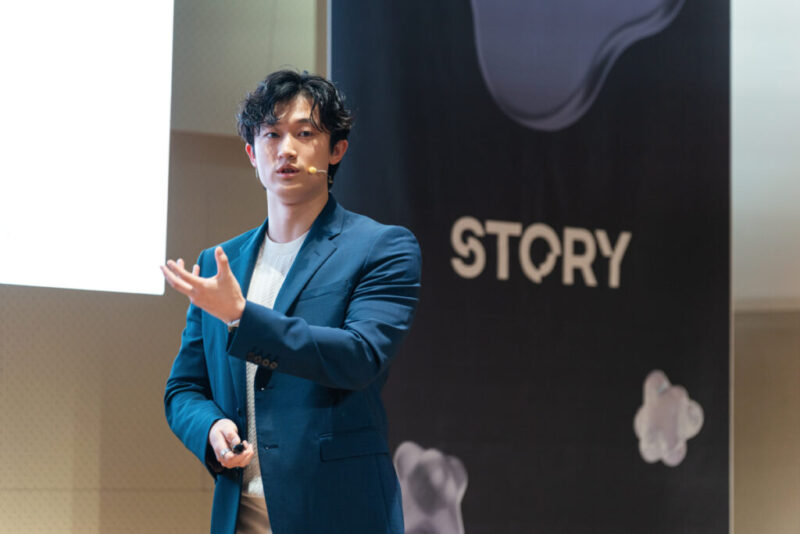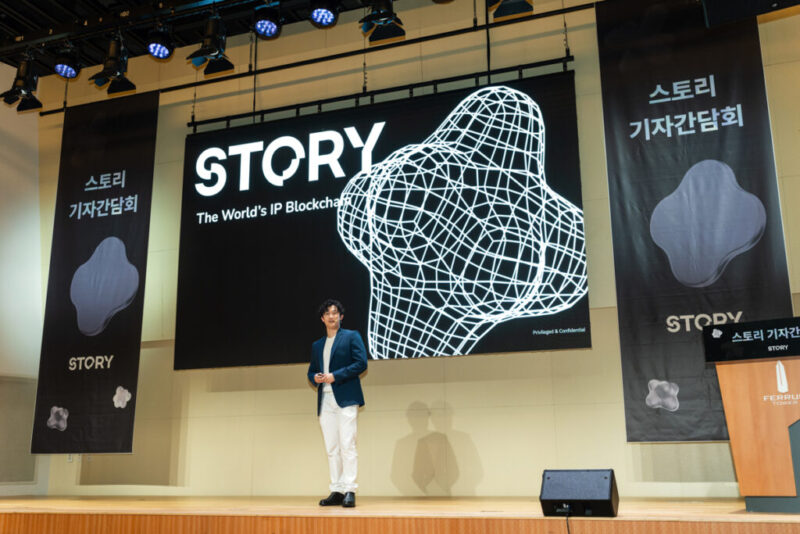PIP Labs;Story Secures USD 80 million in Series B Funding to Revolutionize IP and Generative AI
Programmable IP Labs (PIP Labs), the early developer behind the IP and generative AI ecosystem platform “Story,” has raised approximately 109.2 billion KRW (USD 80 million) in a Series B funding round. The round was led by Andreessen Horowitz (a16z) with participation from Polychain Capital, Samsung Next, Scott Trowbridge (Vice President and board member of Stability AI), David Bonderman (Chairman of TPG Capital), Adrian Cheng (Founder of K11), and Bang Si-Hyuk (Chairman and Founder of HYBE). With this investment, PIP Labs’ total accumulated funding now reaches around 191 billion KRW (USD 140 million).

It is noteworthy that a16z, one of the world’s largest venture capital firms with approximately USD 42 billion in assets under management, has led PIP Labs’ seed, Series A, and Series B rounds consecutively. a16z is well-known for its early investments in companies such as Facebook (now Meta), Twitter (now X), Coinbase, Airbnb, and Skype. Chris Dixon, the Managing Partner who led this investment, was ranked as the top venture capitalist on Forbes’ “Midas List” in 2022.
Story is a Programmable IP platform designed to help creators protect their intellectual property (IP) and generate sustainable revenue. Through the Story platform, creators can upload their IP to a blockchain network and tokenize it. The tokenized IP is stored on the blockchain in an immutable form and remains as an open record accessible to anyone. This allows creators to clearly establish ownership of their IP and protect all rights and revenues generated from reproducing, selling, or distributing their IP.

IP is one of the largest asset classes in the world, encompassing everything from Hollywood films and Billboard chart music to user-generated content (UGC), in-game items and characters in online games, and training data used in AI models. Particularly in recent years, as interest in generative AI (a type of AI that produces new content based on a learning model) has surged across various industries, the value of IP has also been highlighted. Since generative AI requires the learning of massive amounts of IP to produce results, the value of individual IP is expected to increase as AI technology becomes more widespread.
The development and popularization of AI technology have brought significant changes to the IP content market. While AI has enabled anyone to become a creator capable of independently producing studio-quality new IP, large tech companies using large language models (LLMs) are currently exploiting creators’ content without their consent or compensation, raising fundamental issues in the IP industry. As more diverse creators emerge, from food bloggers and video creators to musicians, cartoonists, and artists, the solutions available for creators to protect and expand their IP are still insufficient.
Story was born out of this recognition of the problem. Creators and various applications within the Story ecosystem can post their IP on the Story platform, and the IP registered on the blockchain is expressed as “Programmable IP.” This IP asset can be distributed with various policies and rights specified through programming, and the posted information is publicly verifiable, allowing various applications to freely interact with IP assets.

Seung-Yoon Lee, CEO of PIP Labs, stated, “Big tech companies are using creators’ IP to train their AI models without seeking consent or paying any compensation. This not only takes away all potential traffic that should go to the original creators but also deprives them of potential revenue sources.” He added, “At least Google, in the process of aggregating information to provide services, directed some traffic to the local newspapers that provided the original content. Yet, many local newspapers still disappeared in the end. The current AI environment completely removes the motivation for creators to produce original IP, which will have negative long-term effects on the development of AI technology.”
He continued, “Story will eliminate intermediaries and create a system that benefits both creators and the AI industry, ensuring that creative experiments in the digital space can continue sustainably and prosperously. Through Story, creators can program ownership and licensing of their IP in the form of metadata on the blockchain network. AI models can then adhere to the specified data, instantly distributing fair profits to creators without complicated legal procedures.” He concluded, “Ultimately, we aim to build an efficient industrial system that benefits both the IP and AI markets.”
Chris Dixon, the founder and Managing Partner of a16z’s crypto fund, which handles Web3 investments, commented, “The economic foundation of the internet, a system where content creators and distributors provide supply and demand, is being disrupted by the proliferation of AI. Story is creating the necessary infrastructure to establish a new economic foundation in the AI era. Blockchain is an extremely suitable system for large-scale participants to act according to economic incentives, and the Story platform ensures that creators receive fair compensation for the IP they provide to AI systems.” He added, “Seung-Yoon Lee, CEO of PIP Labs, is a proven innovator, and I am pleased to support his ambitious vision as we lead PIP Labs’ third funding round.”
Jason Zhao, co-founder and Chief Protocol Officer (CPO) of PIP Labs, likens the Story platform to Legoland. In the blockchain industry, the term “Lego” refers to code snippets of individual features implemented as open source, often used to describe the blockchain’s characteristic of easily creating new services by combining various features. Zhao explained, “Think of Story as the Legoland of IP. On the Story platform, individual IP transforms into IP Legos. These programmable blockchain assets can be combined or re-created by numerous applications. IP Legos and generative AI have a yin-yang relationship. When these two come together, creators can gain new opportunities for revenue generation. By giving fun IP Legos and a magic wand-like generative AI to various content fandom markets, they can blend and recombine existing content (games, music, movies, fashion, etc.) to recreate entirely new forms of work.”
Currently, over 200 teams are already building services on the Story platform, targeting more than 20 million IPs across fields such as IPFi (IP Finance), AI, and consumer markets. Ablo from Space Runners is an AI fashion design service that allows anyone to customize and reconfigure the latest fashion items using generative AI, collaborating with various brands like the French luxury brands Balmain, Dolce & Gabbana, Pangaia, NBA champions, and Smiley. Sekai, an AI storytelling platform, supports storytellers, artists, and fans in jointly creating new content by utilizing their IP. Through Sekai, major comic studios can now assemble their IPs like Legos, allowing fans to create multiple spin-off works and thereby securing new revenue and traffic.
PIP Labs also offers various support to ensure that anyone can develop the services they want on the Story platform. Announced in July 2024, the “Story Academy” is a program for Programmable IP developers, providing grants, blockchain education opportunities, and community support to teams launching apps on the Story platform. To date, Story Academy has received over 100 applications from top teams around the world.
With the launch of Story’s mainnet scheduled for later this year, PIP Labs plans to host various events for IP developers starting in September.
MORE FROM THE POST
- Story’s Poseidon Secures $15M Seed Funding from a16z Crypto to Revolutionize AI Training Ecosystem
- Story Protocol raises over $54 million to build a new IP protocol for the internet era
- BIGC Raises 5 Billion KRW in Pre-Series A Bridge Round aiming at Global Entertainment Market
- Artue Secures Strategic Investment from Crit Ventures USA to Build the Next-Generation Global ArtTech Infrastructure
- MOFAC Studios Raised $4.2 Mil. Investment to Expand AI-Driven Production and Global Distribution of Feature Animation
- a16z
- Adrian Cheng
- Bang Si-Hyuk
- Blockchain
- contents
- David Bonderman
- EN
- funding
- generative AI
- HYBE
- IP
- Korea
- Korean startup
- mega funding
- PIP Labs
- Polychain Capital
- Samsung Next
- Scott Trowbridge
- seriesB
- Story
Share
Most Read
- 1
- 2
- 3
- 4
- 5


Leave a Reply